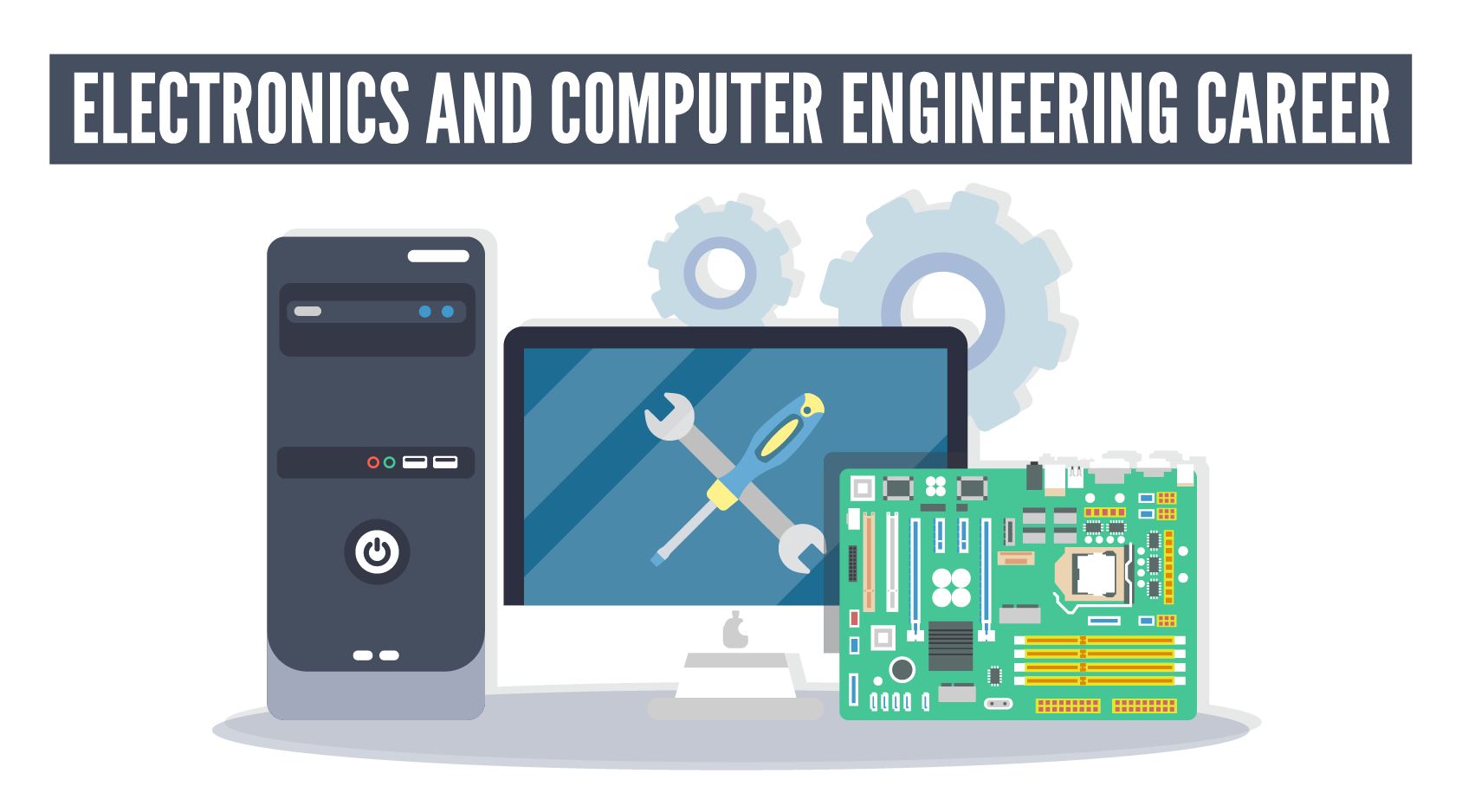Electronics and Computer Engineering is the branch of Electronics Engineering that deals with techniques of building components, devices, systems, or equipment related to computers. It is the study and the application of electricity, electronics, and electromagnetism. The Electronics and Computer Engineering program is designed to focus on dynamic concepts involved in designing new hardware or software.
Electronics and Computer Engineering Technology is a comprehensive study of diverse areas such as: Computer Hardware and Interfacing, Computer-Based Instrumentation and Process Control, Digital Communication and Networking, and Electric Motors and Controls. As industries become more automated and society becomes more dependent on electronic data communication, the demand increases for professionals who can make informed decisions based on technical knowledge and experience.

It is an integrated course in electrical engineering and computer science that aims at developing new computer systems.
Highlights:
| Course Name | Electronics and Computer Engineering |
|---|---|
| Course Level |
B.Tech in Electronics and Computer Engineering |
| Duration |
B.Tech in Electronics and Computer Engineering: 4 years |
| Examination Type | Yearly/ Semester |
| Eligibility |
|
| Admission Process | Merit and Entrance based admission |
| Top Recruiter |
Accenture Solutions Private Limited, Cognizant Technology Solutions, HCL Technologies, Hewlett Packard, etc |
| Top Career Scopes | Software Engineer, Software Developer, Programmer Analyst, Test Engineer, Lecturer, etc |
Top Colleges
The top colleges for the course study of Electronics and Computer Engineering are mentioned below :
- IISC (Indian Institute of Science)
- IITs (Indian Institute of Technology)
- BITS (Birla Institute of Technology and Science)
- IIIT (Indian Institute of Information Technology)
Eligibility:
| Course Name | Duration | Eligibility | Entrance |
|---|---|---|---|
| B.Tech in Electronics and Computer Engineering | 4 Years |
|
JEE MAIN, JEE ADVANCED, OJEE, etc |
Skills Required
- Complex Problem-solving Skills and a Methodical Mind
- Critical Thinking
- Strong Interest in Technology
- Aptitude for Maths
- Communications Skills
- Strong IT Skills
- Time Management and an ability to prioritize and plan work effectively
Syllabus:
B.Tech in Electronics and Computer Engineering
| Semester I | Semester II |
|---|---|
| Technical Communication | Multivariable Calculus |
| Single Variable Calculus | Laplace Transform |
| Matrix Algebra | Computer Programming |
| Ordinary Differential Equation | Digital Electronics |
| Environmental and Energy Studies | Basic Computer Programming |
| Mechanics Engineering | English |
| Physics I | Physics II |
| Chemistry I | Chemistry II |
| Mathematics I | Mathematics II |
| Workshop Techniques | Graphics Engineering |
| Labs | Computer Programming Labs |
| Semester III | Semester IV |
|---|---|
| Mathematics III | Signals and Systems |
| Network Theory | Microcontrollers and Applications |
| Electric Machines | Control Systems |
| Microelectronic Circuits | Data Structures and Algorithms |
| Sensors and Sensor Circuit Design | Probability and Statistics |
| Computer Architecture | Electrical Instrumentation and Measurement |
| Operating Systems | Asynchronous and Synchronous Machines |
| Fourier Transforms and Complex Analysis | Control System |
| Object-Oriented Programming | Economics |
| DC Machines and Transformers | Digital Electrical Circuit |
| ICT security and Tools | Computer Organizations |
| Labs | Seminars |
| Semester V | Semester VI |
|---|---|
| Machine Learning | Power Electronics and Drives |
| Real-Time Embedded Systems | Database Systems and Programming |
| Energy Systems | Computer Networks and Industrial Communication |
| Embedded Digital Signal Processing | Indian Constitution |
| Power Transmission and Distribution | Power System Protection and Switchgear |
| Thermal and Hydraulic Equipment | Power System Stability and Analysis |
| Power Electronics and Drives Control System | Power Electronics & Drives Lab |
| Computer Network and Web Designing I | High Voltage Engineering Testing |
| Software Testing I | Maintenance and Commissioning |
| Cloud Computing Fractional Course | Industrial Workshop |
| Engineering Labs | Renewable Energy Technology |
| Java Dot Net | |
| Substation Designing | |
| Computer Network and Web Designing II | |
| Software Testing II |
| Semester VII | Semester VIII |
|---|---|
| Theory of Computation and Compiler design | Renewable Energy |
| Environmental Science | Technology & Cogeneration |
| Disaster Management | Web Security |
| Utilization & Industrial Electronics | Advanced Power Transmission Systems |
| Simulation of Electrical Systems | Practical Energy Conservation |
| Electrical Machine Design | Audit & Regulatory Issues |
| Project Management & Contract Administration | Projects |
| Computer techniques | |
| Power Plant Maintenance | |
| Microprocessor | |
| Wireless Networking | |
| Organizational Behavior | |
| Data Compression | |
| Secure Software Engineering |
Admission Process:
The admission process generally varies from one college to another. So it is always advised that applicants should check the eligibility and admission criteria of a particular college before applying for a degree in Electronics and Computer Engineering. Some colleges have a merit-based selection process where students are selected on the basis of the aggregate marks secured in the last academic session. However, many of the top institutes have an entrance-based admission process i.e. on the basis of the marks secured in the entrance exams (National/State/University level).
Top Entrances:
1. JEE Main (Joint Entrance Exam )
- Exam Duration: 3 hours
- Application Mode: Online
- Exam Mode: Online and Offline
- Exam Frequency: Twice a year
- Exam: Cancelled
3. WBJEE (West Bengal Joint Entrance Examination)
- Minimum Qualification: candidate must have passed class 12 with Physics and Mathematics along with any one of Chemistry/Biotechnology/Biology/Computer Science/Computer Application as compulsory subjects
- Exam Duration: 4 hours
- Exam Mode: Offline
Career Scope:
| Career/Job Profile | Salary per Annum |
|---|---|
| Software Engineer | Rs 2.5 - Rs 10.5 lakhs |
| Software Developer | Rs 3.5 - Rs 7.5 lakhs |
| Programmer Analyst | Rs 2.5 - Rs 5.5 lakhs |
| Test Engineer | Rs 3.5 - Rs 6 lakhs |
| Lecturer | Rs 4 - Rs 30 lakhs |
Top Recruiters:
- Accenture Solutions Private Limited
- Cognizant Technology Solutions
- HCL Technologies
- Hewlett Packard
Top Recruiting Cities:
- Mumbai
- Bangalore
- Noida
- Pune
- New Delhi
FAQs:
Q: What is Electronics and Computer Engineering?
A: Electronics and Computer Engineering is the branch of Electronics Engineering that deals with techniques of building components, devices, systems, or equipment related to computers. It is the study and the application of electricity, electronics, and electromagnetism.
Q: What are the career prospects available after Electronics and Computer Engineering?
A: The top career prospects are mentioned below:
- Software Engineer
- Software Developer
- Programmer Analyst
- Test Engineer
- Lecturer
Q: What are the top entrances to consider for Electronics and Computer Engineering?
A: Some of the top entrances to consider are as follows:
- JEE Main (Joint Entrance Examination-main)
- SRMJEEE (SRM Joint Engineering Entrance Exam)
- WBJEE (West Bengal Joint Entrance Examination)
Q: Who are the top recruiters in this field of Electronics and Computer Engineering?
A: Some of the top recruiters in this field are:
- Accenture Solutions Private Limited
- Cognizant Technology Solutions
- HCL Technologies
- Hewlett Packard











